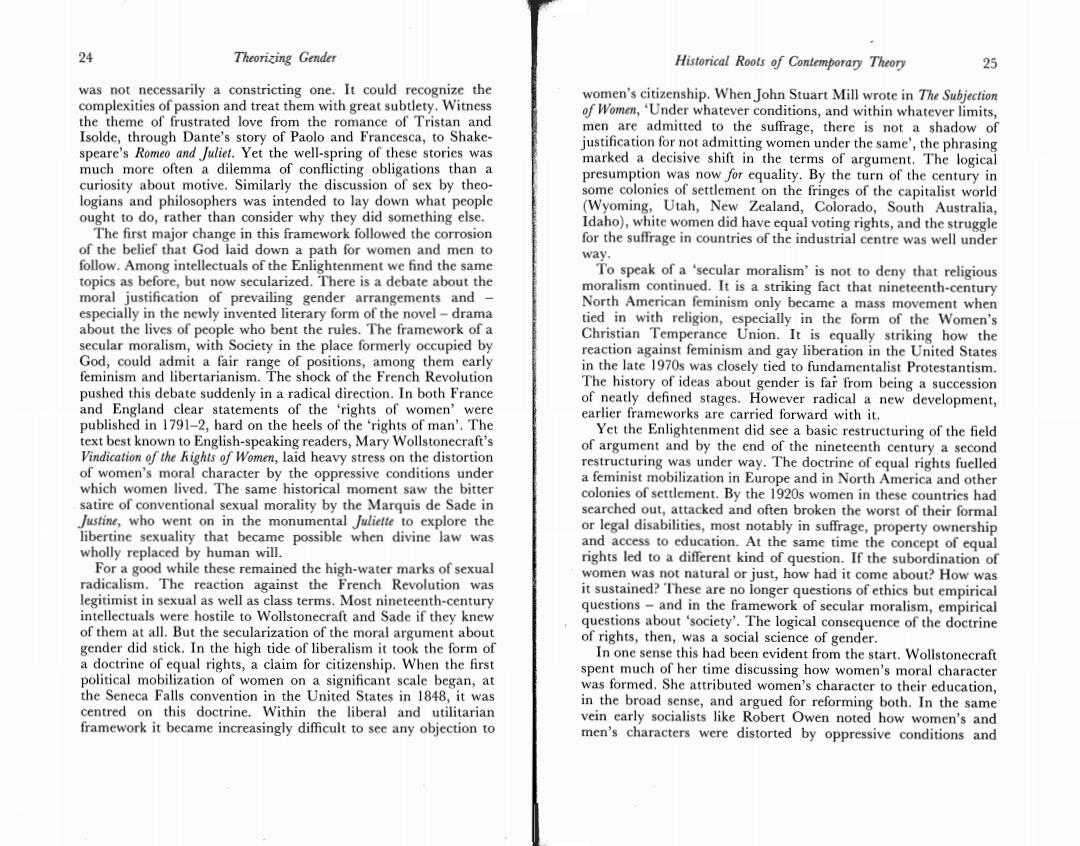正在加载图片...

24 Theorizing Gender Historical Roots of Contemporary Theory 25 was not necessarily a constricting one.It could recognize the women's citizenship.When John Stuart Mill wrote in The Subjection complexities of passion and treat them with great subtlety.Witness of Women,'Under whatever conditions,and within whatever limits, the theme of frustrated love from the romance of Tristan and Isolde,through Dante's story of Paolo and Francesca,to Shake- men are admitted to the suffrage,there is not a shadow of speare's Romeo and /uliet.Yet the well-spring of these stories was justification for not admitting women under the same',the phrasing much more often a dilemma of conflicting obligations than a marked a decisive shift in the terms of argument.The logical presumption was now for equality.By the turn of the century in curiosity about motive.Similarly the discussion of sex by theo- logians and philosophers was intended to lay down what people some colonies of settlement on the fringes of the capitalist world (Wyoming,Utah,New Zealand,Colorado,South Australia, ought to do,rather than consider why they did something else. Idaho),white women did have equal voting rights,and the struggle The first major change in this framework followed the corrosion for the suffrage in countries of the industrial centre was well under of the belief that God laid down a path for women and men to way. follow.Among intellectuals of the Enlightenment we find the same To speak of a 'secular moralism'is not to deny that religious topics as before,but now secularized.There is a debate about the moralism continued.It is a striking fact that nineteenth-century moral justification of prevailing gender arrangements and North American feminism only became a mass movement when especially in the newly invented literary form of the novel-drama tied in with religion,especially in the form of the Women's about the lives of people who bent the rules.The framework of a Christian Temperance Union.It is equally striking how the secular moralism,with Society in the place formerly occupied by God,could admit a fair range of positions,among them early reaction against feminism and gay liberation in the United States in the late 1970s was closely tied to fundamentalist Protestantism. feminism and libertarianism.The shock of the French Revolution pushed this debate suddenly in a radical direction.In both France The history of ideas about gender is far from being a succession of neatly defined stages.However radical a new development, and England clear statements of the 'rights of women'were earlier frameworks are carried forward with it. published in 1791-2,hard on the heels of the 'rights of man'.The Yet the Enlightenment did see a basic restructuring of the field text best known to English-speaking readers,Mary Wollstonecraft's Vindication of the Rights of Women,laid heavy stress on the distortion of argument and by the end of the nineteenth century a second restructuring was under way.The doctrine of equal rights fuelled of women's moral character by the oppressive conditions under a feminist mobilization in Europe and in North America and other which women lived.The same historical moment saw the bitter colonies of settlement.By the 1920s women in these countrics had satire of conventional sexual morality by the Marquis de Sade in searched out,attacked and often broken the worst of their formal Justine,who went on in the monumental fulielte to explore the libertine sexuality that became possible when divine law was or legal disabilities,most notably in suffrage,property ownership and access to education.At the same time the concept of equal wholly replaced by human will. rights led to a different kind of question.If the subordination of For a good while these remained the high-water marks of sexual women was not natural or just,how had it come about?How was radicalism.The reaction against the French Revolution was legitimist in sexual as well as class terms.Most nineteenth-century it sustained?These are no longer questions of ethics but empirical intellectuals were hostile to Wollstonecraft and Sade if they knew questions-and in the framework of secular moralism,empirical questions about 'society'.The logical consequence of the doctrine of them at all.But the secularization of the moral argument about gender did stick.In the high tide of liberalism it took the form of of rights,then,was a social science of gender. In one sense this had been evident from the start.Wollstonecraft a doctrine of equal rights,a claim for citizenship.When the first political mobilization of women on a significant scale began,at spent much of her time discussing how women's moral character was formed.She attributed women's character to their education, the Seneca Falls convention in the United States in 1848,it was centred on this doctrine.Within the liberal and utilitarian in the broad sense,and argued for reforming both.In the same vein early socialists like Robert Owen noted how women's and framework it became increasingly difficult to see any objection to men's characters were distorted by oppressive conditions and